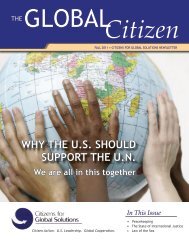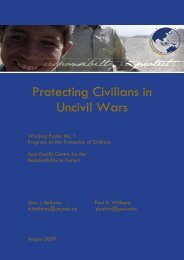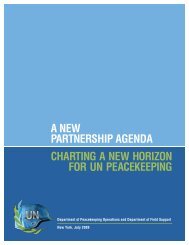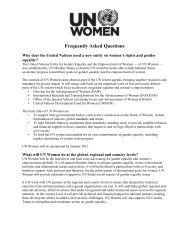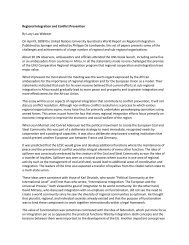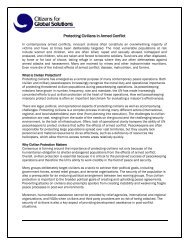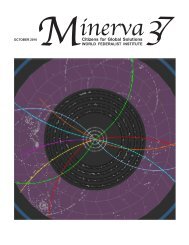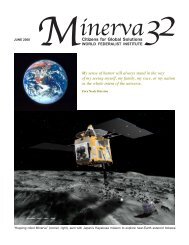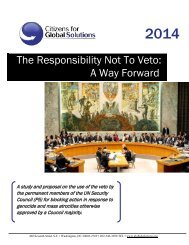The protestors in Tahrir Square and elsewherein the Middle East, the indignadosin Spain and Greece or the wütburger inGermany, ... are experimenting with newsocial arrangements and new <strong>for</strong>ms ofdiscursive democracy. But they need aninstitutional response. Change is blockedat a national level, the policies and assumptionsof the past are imprinted on thestructures of the nation-state and on theassumptions of national politicians. Somechange is possible at local and regionallevels but there also needs to be a globalagenda, especially in the fields of finance,security and environment.The hydra-headed crisis is also a Europeancrisis. The crisis of the euro, likethe wider financial crisis, is an expressionof deeper underlying factors. Yet theEuropean Union also could represent ananswer to the crisis. It has to go <strong>for</strong>wardsif it is not to go backwards. To save theeuro, policies will have to be adoptedthat could offer a model <strong>for</strong> the rest ofthe world. This may well not happen, ofcourse, but that is why activists and othersneed to campaign at a European level andnot just at local and national levels.The reason that the European Union containsthe seeds of a solution is because itis a new type of political animal. It originatedas a peace project, in reaction to twoworld wars and the holocaust. By trial anderror, it has developed as a new <strong>for</strong>m oftransnational governance designed not todisplace the nation-state but to constrainits dangerous tendencies. It adds a newlayer of political authority rather than establishinga new pole of political authority.It is a multilateral institution but goesbeyond internationalism (between states)and possesses an element of supra nationalism(beyond states). It offers new possibilities<strong>for</strong> public intervention that is notstate-based.In practice, actually existing Europe appearsvery different. Indeed, it seems to belittle more than a neo-liberal bureaucracy.As Pianta and Rossanda have shown, theneoliberal policies that underpinned theeuro have been immensely destructive insocial and economic terms. The LisbonTreaty was supposed to establish a moreunified political leadership but in fact itproliferated Presidents largely unknownto the public – the Union now has a Presidentof the Council, a rotating Presidencyof the Council, a <strong>for</strong>eign minister, a Presidentof the Commission, all appointedthrough a murky backstage method andfew European citizens are even awareof who they are. The result is a politicalvacuum made worse by a tendency <strong>for</strong>national governments to blame Europe<strong>for</strong> their own incapacity to respond topopular demands.Yet precisely because the European Unionis new type of political animal it has thepotential to address some of the underlyingsources of the crisis in a way that isnot possible <strong>for</strong> nation-states. There is, ofcourse, a risk that the euro will collapseand that the EU will disintegrate. But inorder to <strong>for</strong>estall that possibility somechanges are happening almost by stealth.Eurobonds have, in effect, been createdby the decision to convert national debtto European debt. Almost unnoticed,President Sarkozy and Chancellor Merkelagreed to a tax on financial transactions–something long demand by activists inthe social <strong>for</strong>ums.At root the weakness of the Europeanproject was that it has always been anelite project. It lacks the social compactthat underpinned the state. The protestorsin different parts of Europe are howevermainly focussed on local demands, butthose local demands can only be met withina wider European framework. How canthe current popular mobilisation connectup and frame a European agenda? Suchan agenda might include:• A new fiscal mechanism that would raisetaxes at a European level – a tax on financialtransactions <strong>for</strong> example, and acarbon tax – and would increase spendingand redistribution at a European level.• A new social policy aimed at reducinginequality and promoting jobs, especially<strong>for</strong> young people. Some have proposed aMarshall Plan <strong>for</strong> youth.• An economic strategy aimed at resourcesaving as opposed to labour saving thatwould be both economically and environmentallysustainable.14 • <strong>Minerva</strong> #39 • November <strong>2011</strong>• A renewal of the peace project includingcosmopolitan citizenship, reaching out tothe new democracies in the Middle Eastthe way it reached out to Eastern Europe,and a human security rather than a nationalsecurity policy.• A reinvigoration of democracy both locallyand at European level — a widespreaddebate at local levels, in town hallsand public squares, as well as a way ofpublicly electing an accountable politicalleadership.Change of this kind in Europe could havefar reaching consequences <strong>for</strong> global arrangements.The EU is still the largestsingle economy in the world. But it lackspopular legitimacy. How can the road toEurope be reinvigorated from the bottomup? Is another Europe possible? A peacegreen-democratic-cosmopolitanEuropeinstead of a neo-liberal bureaucracy?The goal is to provide an institutionalmodel that could tackle the multiple crisesthat are piling up, that could channelthe new technologies into emancipatoryapplications, and that could address themismatch between pervasive changes insocial relations and the institutions of anearlier era. We need to reinvent the roadto Europe.ïAn international study, to which 21 universitiesworldwide contributed, considersthe potential <strong>for</strong> new states to emergein the EU, hypothesizing a “fourth waveof independence”. Enlarging democracyin Europe – New statehoods and processesof sovereignty was presented to theEuropean Parliament on 11 January, at theinitiative of Catalan MEP Oriol Junqueras.The study suggests, among other possibilities,Scotland, Flanders, the BasqueCountry, and Catalonia — all with theirown languages, past institutions, andother relevant social & historical factors(Agence Europe, 11 January <strong>2011</strong>).
European Union and <strong>Global</strong> UnionBOOK REVIEWThe Uniting of Nations: An Essay on <strong>Global</strong> Governanceby John McClintockRonald J. GlossopOctober <strong>2011</strong>World Federalist Institute FellowRonald J. Glossop is Professor Emeritusof Philosophy and Peace Studies atSouthern Illinois University at Edwardsvilleand author of Confronting War (4thed., 2001), among other books.The Uniting of Nations: An Essay on<strong>Global</strong> Governance, by John McClintock,Brussels: P.I.E. Peter Lang, 3rd ed, 2010“Nothing like a United States of Europehas ever been built be<strong>for</strong>e, a half-billionpeople brought together not throughconquest but by the idea of “ever closerunion”. In a way it’s an inspirationalblueprint <strong>for</strong> mankind; and so it wouldbe foolish to think it would go smoothly.Yes, the League of Nations collapsed,but it did lead to the United Nations. Theeuro may also unravel but the idea istoo good not to return in <strong>for</strong>ce. Betweenthe League and the UN lay catastrophe.From here to euro 2.0 is not going to bepretty.”~ Roger Cohen, London,29 November 2010The Uniting of Nations argues <strong>for</strong> the need <strong>for</strong> a governed world community and usesthe European Union as a model <strong>for</strong> how that can be accomplished. One must start withsmall steps and proceed gradually in such a way that national governments will wantto join to gain something specific <strong>for</strong> themselves. The European Union would be thenucleus and other countries could join this global political union separately, but theywould then be required to work together to <strong>for</strong>m their own regional organizations.Thus eventually there would be a world federation made up of regional federations,one of which would be the European Union which initiated the new global organization.McClintock begins the book with a summary <strong>for</strong> those “who do not have time to readthe whole essay” (p. 17). The world faces many problems, problems which no countryby itself can solve and which can only get worse. The only way <strong>for</strong>ward is <strong>for</strong> countriesto work together. Europe is a region of the world demonstrating how nations canshare sovereignty in order to improve both their national welfare and the welfare ofthe whole group. “What Europe has done, the world needs to do. This essay explainshow” (p. 18).The many current global problems not being handled shows that “the present systemof global governance is dysfunctional” (p. 18). The basic problem is the lack ofa sovereign governing body <strong>for</strong> the whole global community which can make anden<strong>for</strong>ce laws as sovereign national governments do within countries. Just as citizensshare sovereignty in order to establish a governing body within their nations, so nationalgovernments need to share sovereignty in order to establish a governing bodyat the global level. The European Union is a good example of a governing body overnations that has both sovereign powers and political legitimacy. On the other hand, theUN’s Security Council has impressive powers on paper but not in the real world. TheUN Security Council also lacks political legitimacy because 5 countries are permanentmembers with a veto power while at any one time only 7% of the 193 countries arerepresented at all.The global community must do two things: assist the failing nation-states and “bringinto being a governing body which can act effectively at the global level” (p.23). Butthe first task itself requires “a system of global governance that works” (p. 24) andthe rules set down in the UN Charter are such that the Security Council can never bere<strong>for</strong>med. “Something new needs to be created” (p. 25). This new global organizationcould be initiated by “the European Union and around half-a-dozen or so pioneerstates” (p. 26).As was done in Europe the new global governance community could start with a fewcountries focused on a single problem like food security (p. 27) and then “a community<strong>for</strong> climate, energy, and prosperity” (p. 28). As the European Community was furtheredby the Zeitgeist of a united Europe, so the current Zeitgeist of globalism can supportthe creation of a <strong>Global</strong> Union. Perhaps future historians will see the European Unionas an experiment in sharing sovereignty by states that could be followed by the wholeworld.[continued, next page]15 • <strong>Minerva</strong> #39 • November <strong>2011</strong>



